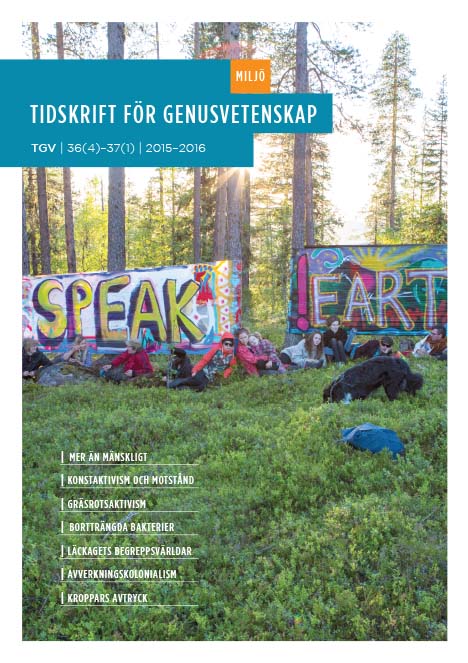Om fluiditet, läckage och kvinnors kroppar
DOI:
https://doi.org/10.55870/tgv.v37i1.3157Nyckelord:
genus, fluiditet, läckage, kropp, miljöAbstract
Informed by previous works within gender studies, postmaterialist studies and environmental humanities, this article explores the connections – and potential reciprocities – between the term fluidity and the term leakage. Both terms can be said to depict movements of liquids, but whereas fluidity translates to the ability to flow and the state of being fluid leakage translates to (unwanted and/or accidental) loss and to exude, spill and secrete. Investigating fluidity and leakage in relation, both to environmental spills and women’s bodies, this article seeks to a) show similarities as well as differences between exploitation of nature and oppression of women, b) encourage an understanding of the two terms as gendered, and c) emphasize materiality, not as a blank slate awaiting cultural inscription, but as an active part of its own becoming. The hypothesis is that leakage is an active, innate, but first and foremost unruly part of every attempt to enclose and contain, something that leads me to suggest that there is an inherent resistance in the leakage – in the movement itself – that remains ignored in recent discussions of fluidity, particularly from a postmaterialist stance. Similar to fluidity, leakage changes and transforms, both in relation to social structures, its own material composition as well as the particular context that encompasses it; however, the former also carries its own resistance in that it is involved in, and co-constituted by different kinds of oppositional practices that spur disgust, repulse and calls for different kinds of measures. This is evident, specifically in relation to waste, where leakage can provide an understanding of the continuous negotiations that occurs as waste both defines, and is defined by (the constant threat of) leakage.
Nedladdningar
Downloads
Publicerad
Referera så här
Nummer
Sektion
Licens
Författaren/författarna behåller copyright till verket.





